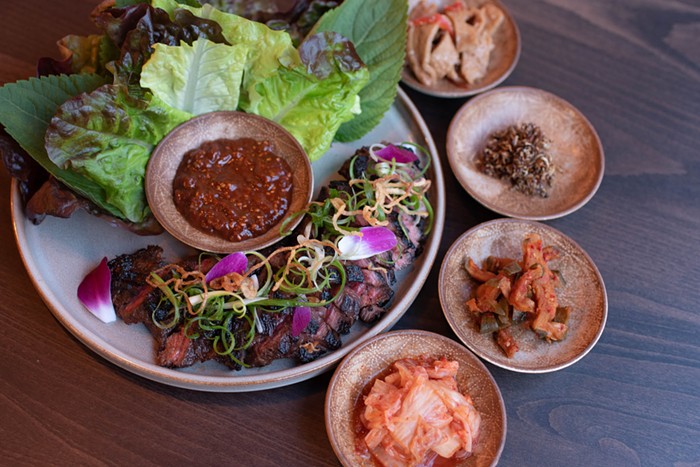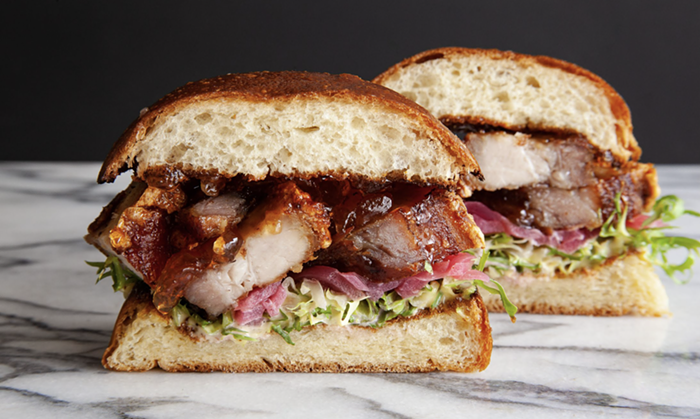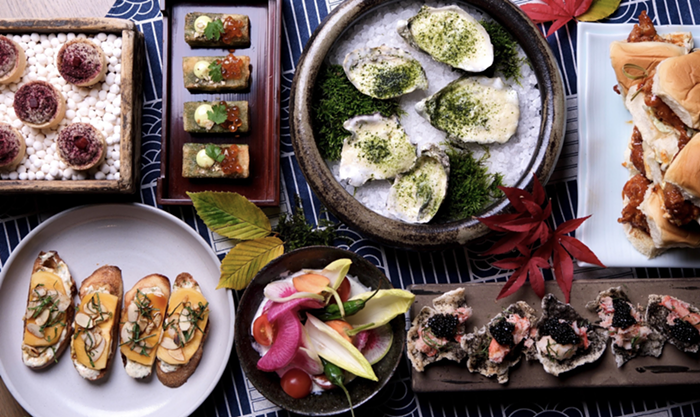When I first heard about Cook Weaver, I was admittedly skeptical. For one, they'd chosen to open in a space that can generously be described as a tough one for restaurants. A death trap would be more accurate. This little corner of the illustrious Loveless Building has been occupied by plenty of restaurants, dating back to the original Byzantion, and not one has seen long-term success. Furthermore, the menu was billed as "inauthentic Eurasian food," which does not read like the type of coherent, focused mission statement a restaurant would need to survive in such hostile environs.
Having had the pleasure of dining at Cook Weaver several times now, I can say confidently that none of that skepticism remains. It is, by a long shot, my favorite new restaurant in 2017, and I would go so far as to say that it might be the one to finally break the curse that so many other worthy challengers have succumbed to.
Firstly, owner/chef Zac Reynolds and co-owner Nile Klein embrace the quirks and idiosyncrasies of the space masterfully. The interior is wallpapered with a mural depicting Alexander Pushkin's famous story The Tale of Tsar Saltan, in which the tsar's scheming sisters-in-law sabotaged his wife by locking her and her son in a barrel and casting them out to sea. (Klein's cheeky SparkNotes version of the story, available on their website, is just one of the restaurant's many delights.) Their design gives that mural the celebration it deserves—their restaurant's name is even a nod to it, as the two sister saboteurs were a cook and a weaver. Some previous tenants have failed to do the same.
The space is small, so they eschewed even a curtain for the kitchen door in order to open things up a bit, and even invite diners to walk in and gawk. The main dining room feels big and active, but there's also a smaller side room that is instantly attractive to every two-top Tinder date seeking a bit of privacy, and the staff manages this duality extremely well. This brings me to the second reason they're thriving here: the staff.
Cook Weaver is mostly operated by Reynolds, whose culinary credentials include a stint at Chicago's NoMI, and Klein, a barman who most recently managed the booze at Belltown's Kushibar. They met via Craigslist: Reynolds posted an ad seeking a partner, Nile responded, they clicked (boy do they click), and they opened a restaurant together. It sounds crazy, and it is crazy, but it seems to work really well. It's hard to imagine, after spending an evening in their clutches, that they haven't been friends for years, and the impact of their combined personalities on the restaurant's atmosphere cannot be overstated.
Never once have I dined at Cook Weaver—and the majority of my dinners involved me attempting to read alone at the bar—without being happily sidetracked into conversation with Klein, a fellow patron, or usually both. This is inevitably followed by a visit from Reynolds, who makes a habit of dropping off dishes himself and engaging in easy conversation. In this emotionally isolated city of ours, it's invigorating.
While I am increasingly convinced that a restaurant's ethos is as vital as its food, there's still no getting around the food. And holy shit, the food. I could go on for ages about the dishes I thought were excellent, but I'll confine this to the ones I thought were truly exceptional, and add that I did not have a single dish that was uninspired or underwhelming. Everything I ate was oozing with thought and intention, which are seasonings I consider every bit as important as salt these days.
Their chicken-liver mousse ($8), served on house-made rye bread with sweet-and-sour cabbage, is insanely, ethereally fluffy. It floats across your palate. The crab seasoning fried chicken ($14)—served with sprigs of Chinese celery, crumbled peanuts, and pickled daikon—is the best fried-chicken preparation I have ever had, even taking into account the entire day I spent on a fried-chicken tour of New Orleans. And their beer-battered nori dumplings ($8) are just cool.
Nori is the seaweed most commonly found wrapped around sushi, but it's the star of this dish—formed into little pillows, dredged in a light beer batter, fried, and served atop a thin layer of bracing house-made kimchi. The accompanying tahini sauce is as arid and oily-smooth as the kimchi is sharp and piquant, which makes for a magnificent symphony of flavors. Also, like every dish Reynolds sends out, the dumplings look like a work of art, and not in the creepy, empty-white-plate way that was so emblematic of 1980s excess in American Psycho. Rather, the dish's balanced color composition and whimsical tendrils of crispy batter inspire you to pause for a moment, appreciate the attention to detail that went into it, and then dive in enthusiastically.
Unsurprisingly, Klein’s libations are as in tune with the food as he is with Reynolds. The Sly Deceiver—a Cynar soda with lemon and a float of rye whiskey—is the perfect start to a meal, and priced appropriately for an aperitif at $8. He sources his wines from all over, and he introduced me to a mesmerizingly resiny Lebanese blend ($13) that was just the thing for their perfectly mid-rare zabuton steak ($32). It was something like a red version of retzina, which is a notoriously challenging wine. I was honestly a little shocked that he was bold enough to offer something like that as a glass pour, but also heartened, as I think this city needs more restaurateurs who are willing to throw caution to the wind. We’re not paying these prices to be bored, after all.
Indeed, there are plenty of places you go for comfort and familiarity, but an upscale, off-the-beaten-path bistro should not be one of them. These days, however, I see a lot of high-end restaurants that have hit upon a moneymaking formula and are loath to stray from it. Cook Weaver—announcing itself as irreverently, unabashedly “inauthentic”—has no formula, and it has absolutely no qualms about pushing its patrons outside of their comfort zone. All while providing a superlatively comfortable, pleasant experience, no less.
I suspect this courage comes from their unwavering, if somewhat inadvisable, dedication to good food and genuine hospitality over all else. I won’t disclose how little they’ve paid themselves over the last six months, even though they guilelessly disclosed it to me, but I will say it’s a lot less than they deserve for what they’re doing.
However, while money and taste don’t necessarily go hand in hand in modern Seattle, I like to think there are enough people left with both to sustain this duo’s quixotic venture. They might be in the most overlooked restaurant space on Capitol Hill, but the things they’re doing there are absolutely not to be missed. ![]()



















